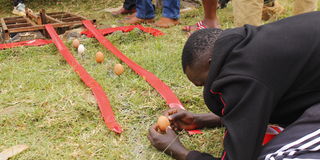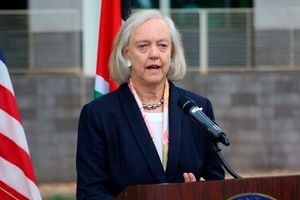Who moved the equator?

A man tries to balance an egg on a nail at an Equator line along Meru-Embu road on June 6, 2022.
Three years after a conflict over the equator line along the Meru-Embu road that saw signage put up by the Kenya Tourism Board burnt down, a group of local investors has now revived the controversial location by setting up a curio shop.
Since the 1970s, the equator line that cuts across 13 countries in the world, including Kenya, was believed to pass through Gatimbi town, the Imenti Central sub-county headquarters.
However, in August 2018, the Kenya Tourism Board, as part of its efforts to promote equator line-based tourist attractions, put up the signage at Mwiramwanki in North Imenti, about one kilometre north of Gatimbi and six kilometres south of Meru town.
The move left the Meru-Embu road with false and accurate equator line markers.
The relocation of the signage did not go down well with some residents of Gatimbi, which is also known as Equator, who accused the government of ‘taking away’ their equator.
“The relocation has sparked differences between Abothuguchi (Imenti Central) and Miriga Mieru (North Imenti),” Mr Benson Kimaita, a resident of Mwiramwanki, said in 2018.

Sanaa Culture CBO patron Eric Mutwiri puts up a signage at an Equator line along Meru-Embu road on June 6, 2022. Three community groups have established a curio shop at the equator to tap into equator tourism.
Equator signage had been relocated
Meru County Tourism Executive Maingi Mugambi said at the time that the equator signage had been relocated to Mwiramwanki Primary School after experts established that the imaginary line was wrongly marked along the Meru-Embu road.
“Experts noted that the equator signage that has been at Gatimbi since the 1970s was not in the right position. They used the GPS system to mark the right place,” Mr Mugambi said.
But more than three years later, three community groups, including Sanaa Culture Community Based Organisation (CBO), Murithi Mpuri Cultural Centre and North Imenti Youth Initiative have established a curio shop at Mwiramwanki to tap equator tourism.
Sanaa Culture CBO patron Eric Mutwiri said the equator line provides an opportunity for residents to make money not only from the tourist attraction but also from the sale of artefacts and showcasing the Ameru culture.
“We are advocating for homegrown solutions to create job opportunities for our people. This is why we earmarked the equator as one of the opportunities for making money,” Mr Mutwiri said.
“Due to the strategic location, we will be able to sell various artefacts, and traditional food and showcase our culture. Art is a multibillion-shilling industry which is not well exploited.”
The world over, the equator line is a major tourist attraction, with visitors making stops to take photos and watch ‘equator tricks’.
Mr Mutwiri said the curio shop would provide a market for women and youth groups involved in beadwork, crocheting and basketry.
Mpuri Cultural Centre founder Joshua Murithi said his establishment will provide information on Ameru traditions and history.
He called for the beefing up of security at the equator point to avert malicious damage as it happened in 2018.





